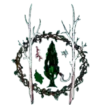At festival, blessings and lessons
Pagan Pride Day highlights nature-focused traditions, practices that predate Christianity
By Liz F. Kay
sun reporter
October 1, 2006
A small group formed a circle yesterday morning in Gwynns
Falls/Leakin Park to honor the four compass directions and to bless
water, salt, yeast and flour.The opening ritual, part of Baltimore’s first Pagan Pride Day, kicks
off a week of activities in the Baltimore-Washington area. Organized
by the Open Hearth Foundation, the events are designed to help
followers of different pagan traditions educate others about their
practices, which generally focus on nature and profess beliefs that
predate Christianity.Ingredients blessed as part of the opening ritual will be baked into
bread and served during a closing ritual Saturday in College Park.Open Hearth estimates there are between 10,000 and 25,000 pagans –
including followers of Wicca, Druidry and other traditions – within
an hour’s drive of Washington. A 2001 survey by City University of
New York put their number at nearly 200,000 nationwide, but this
approximation might be low.“Part of the problem is a lot of the people who practice paganism
aren’t terribly public about it,” said Sherry Marts, vice chairwoman
of Open Hearth’s board of governors. “We jokingly say they’re in the
broom closet.”Even at public pagan events, some only identify themselves
by “magickal” names – spelled with a “k” to distinguish it from
sleight-of-hand illusions – because followers have lost their jobs
and their children because of discrimination, Marts said.“One of the ironies of Pagan Pride Day is that we all can’t be as
proud as we’d like to be,” she said. However, “there’s really nothing
scary or threatening about what we do. In fact, there’s a lot of
positive stuff.”The Open Hearth Foundation’s goal is to establish a pagan community
center in the Washington area where groups could offer workshops and
other activities. Small groups usually conduct most rituals
outdoors. “We acknowledge the space we’re in as sacred wherever we
are, rather than setting aside space that’s sacred,” Marts said.The local celebration is part of an international campaign of Pagan
Pride Days.“Events like this are here to show we do have a strong community,”
said Kathryn Rosenmann of Hampden, a program trustee of the
foundation. The day’s events also included music, workshops about
different pagan communities and a canned-food drive. “Monotheists
don’t have a monopoly on charity,” she said.A light rain sprinkled those participating in the opening ritual,
which combined aspects of Wicca, a nature-based practice of benign
witchcraft, and Druidism, which Open Hearth describes as religious
beliefs and philosophies based on ancient Celtic culture.“The one problem with nature religions is nature,” Marts said.
The ritual recognized last week’s fall equinox, the occasion of a
harvest celebration called Mabon. Participants formed a circle around
a tree and a small table that held a votive candle and a small
caldron, symbolizing fire and water. Three Druids held three crossed
sickles and pulled them apart to consecrate the land at the beginning
of the ritual.The group also made offerings to ancestors and nature spirits, said
Stephanie Stills, an Open Hearth program associate. She belongs to
CedarLight Grove, a Druid community that meets weekly in Hamilton.In the afternoon, Dundalk residents Pamela Griffith and Michael
Fenwick led a workshop on the Correllian Nativist tradition, a form
of Wicca.Griffith said she taught Catholic religious education for nearly two
decades before becoming Wiccan five years ago. Fenwick also was born
and raised Catholic before making a similar transition in 2002, when
his daughter introduced him to the tradition.Both are Wiccan clergy, registered with the Washington-Baltimore
Pagan Clergy Association, who worship with the Temple of the Sacred
Arts, which includes followers from Maryland, Virginia and
Washington. They see many connections between Wicca and modern
culture. Many Christian holidays include customs with pagan roots,
they said.“People teach spells all over the world,” Fenwick said. “‘Rain, rain,
go away, come again some other day’ – that’s a spell.” And children
cast their first spells when they make a wish and blow out their
birthday candles, Griffith said.Glen Burnie residents Caryn MacLuan and William Pierson, both of
CedarLight Grove, began a workshop on Druidry by discussing the
definitions of religion and of pagan, which is derived from the Latin
for “country dweller.” Druids use individual study to learn about the
world around them, Pierson said.“By and large, it’s a personal thing,” MacLuan said.

